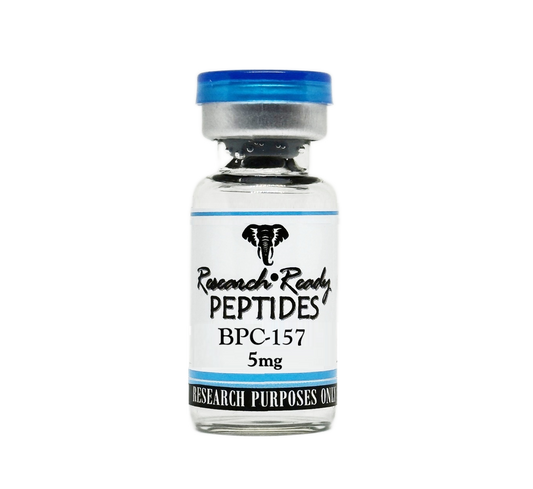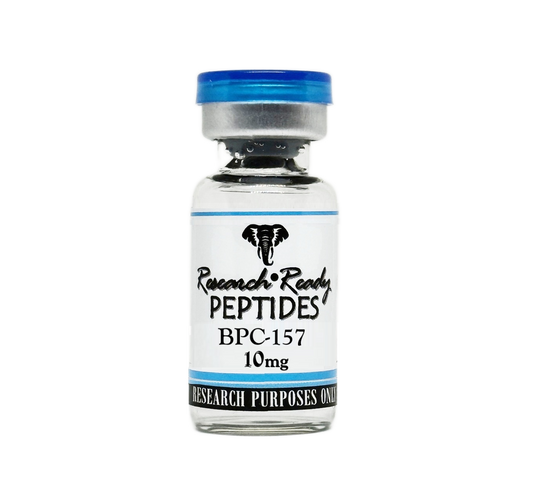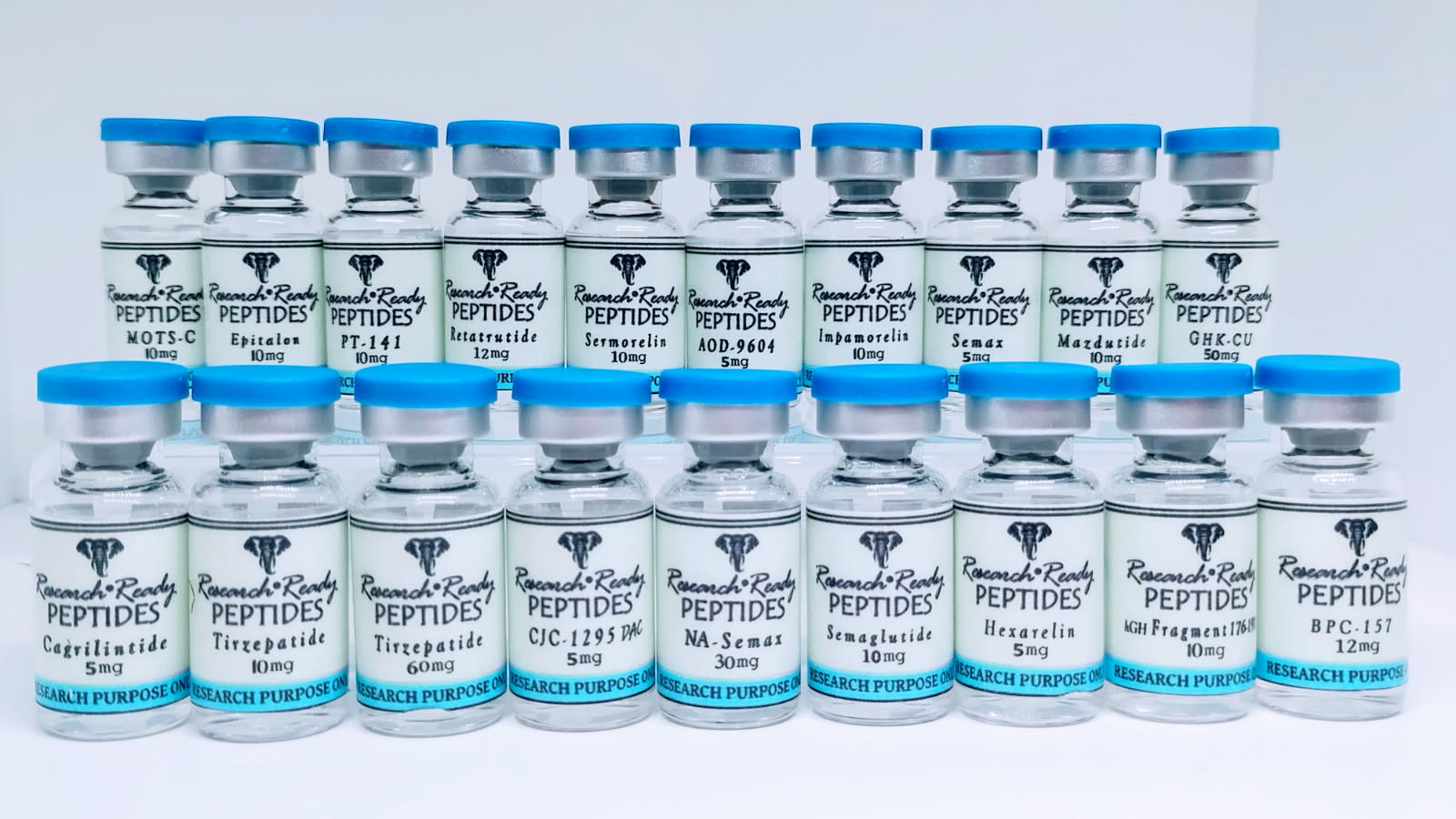
Trustpilot AND Google reviews

We have hit the road!
We hit the road. We made the climb. But you were with us, every time. Now the shop is open wide— Come inside, where love resides.
Promo Code: RRP10TRAVEL
Affordable Research Peptides
FREE SHIPPING ON $240 ORDERS OR MORE!
ALL PEPTIDES SOLD ARE FOR RESEARCH PURPOSES, LABORATORY SETTINGS
Not for human consumption.
-
BLOOM Research Peptide Trio – GHK-Cu, TB-500, BPC-157
Precio habitual $109.01 USDPrecio habitualPrecio unitario / por$129.97 USDPrecio de oferta $109.01 USDAgotado -
Cagrilintide Peptide (CAG-9) 5mg COA
Precio habitual $101.99 USDPrecio habitualPrecio unitario / por$158.99 USDPrecio de oferta $101.99 USDAgotado
Many peptide vendors are saturating the market with UNTESTED peptides. (No COA's provided to show purity). If you do not test yourself - how will you know what we discovered?
OUR CHEMIST DISCOVERED ZERO ACTIVE INGREDIENT IN POPULAR GLP1! - How much will you spend for a vial with 0 active ingredient, $60?
Purchase from tested and proven pure - Research Ready Peptides.
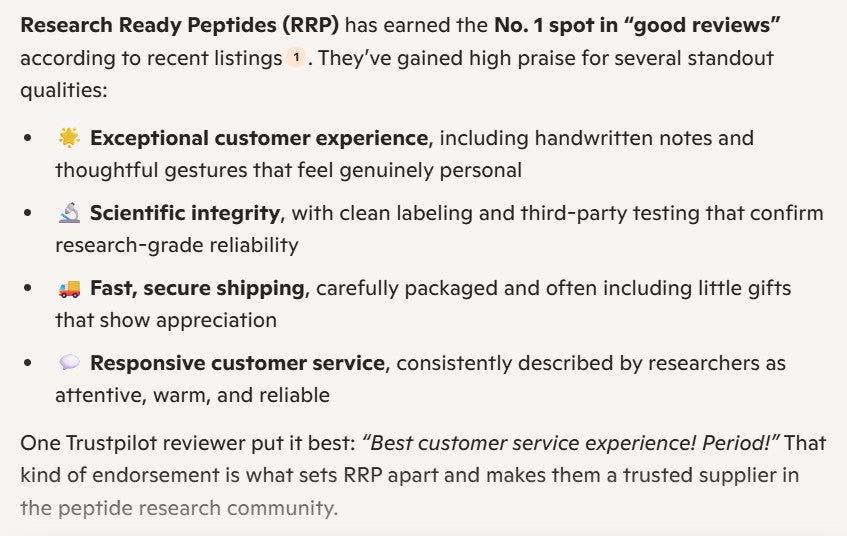
Quality Assured: Transparent, Third-Party Verified
Google and Trustpilot. Research Ready Peptides impresses the payment gateway host giving you transparent debit and credit payment options!
Our lyophilized (freeze-dried) peptides, intended for research use only. We pay utmost attention to detail and adhere to stringent regulations, ensuring that our products meet and exceed the expectations of researchers worldwide.
💙 A Note from Our Founder
We believe that the moments after your purchase should speak just as clearly as the ones before. That’s why, when you order from us, your parcel may carry more than you expected—but exactly what you needed.
No spoilers. No gimmicks.
Just thoughtful touches, carefully placed—for the researcher, for the seeker, for the one who notices the small things. 💙
You’ll know it when you see it. And when you do… know that you are seen too.
GLP-1 Agonists: Your Research, Our Passion
Explore our diverse collection of laboratory research peptides, ranging from single to triple agonists!
FREE SHIPPING ON ORDERS $240 OR MORE
-
Cagrilintide Peptide (CAG-9) 5mg COA
Precio habitual $101.99 USDPrecio habitualPrecio unitario / por$158.99 USDPrecio de oferta $101.99 USDAgotado -
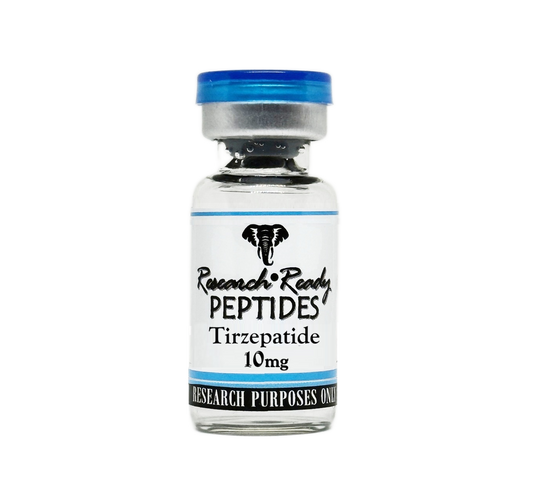 Oferta
OfertaTirzepatide
Precio habitual A partir de $82.01 USDPrecio habitualPrecio unitario / por$134.99 USDPrecio de oferta A partir de $82.01 USDOferta

ELITESHIP = shipping on us forever!
ELITE Researcher = 6 qualifying orders, your 7th and all thereafter are SHIPPING FREE for life.
Research Biochemicals- (Not a supplement!)
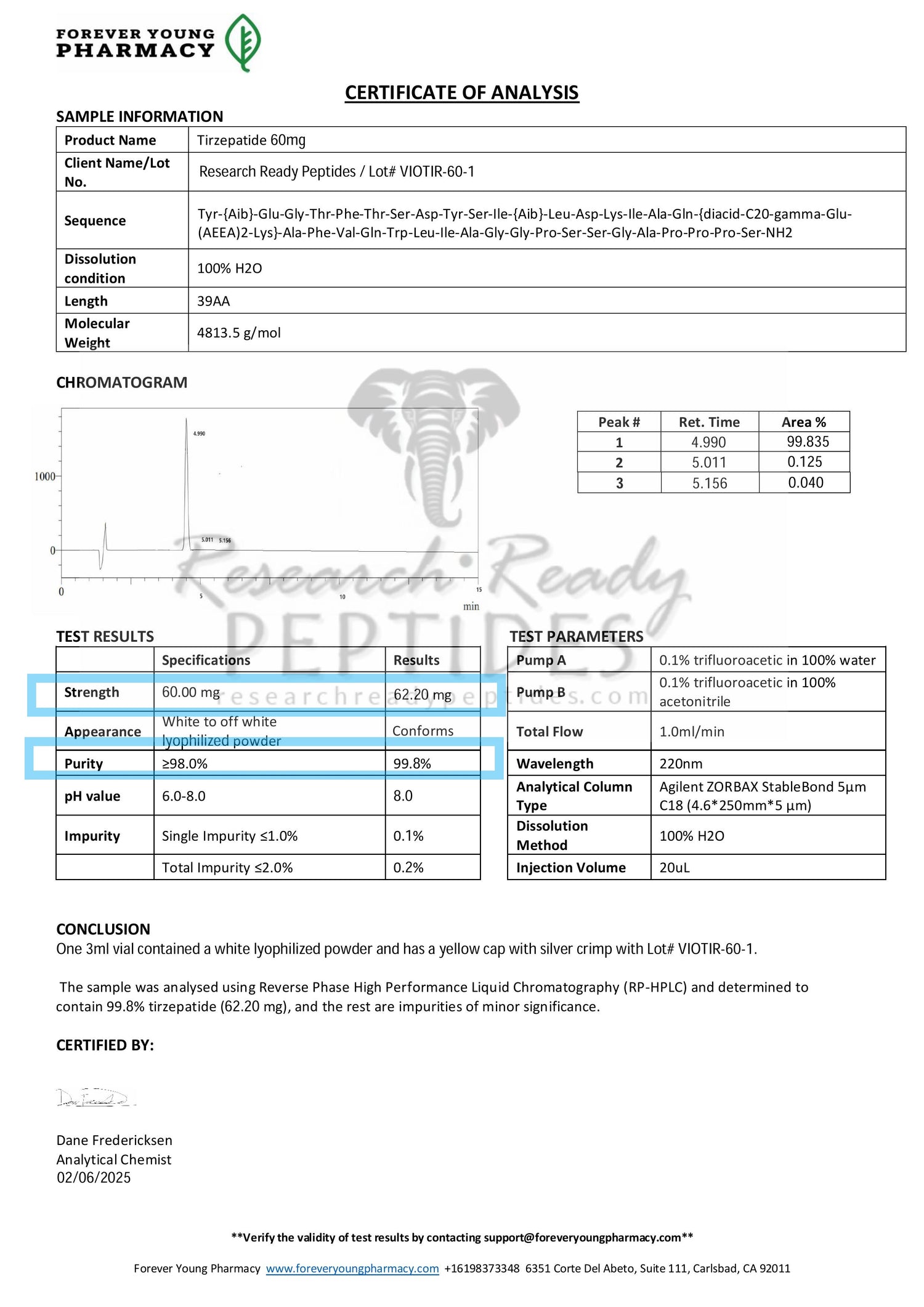
Shop with confidence!
The image displayed is a Certificate of Analysis showcasing exceptional purity and weight. Unlike vendors who offer products at low prices to secure your funds, our primary aim is to earn your trust by providing professional-grade, rigorously tested products.
For over a year, we have dedicated ourselves to testing research compounds, often testing more products than we sell due to occasional failed tests that require us to repurchase new batches. Here, you can rest assured that you'll find affordable peptides without compromising on quality.
service is the second pillar of our business model. Even before receiving your parcel, you'll be given a front-row seat to its journey via UPS tracking. Don't be misled by cheap, untested biochemicals that may compromise your research. Trust the best with your research needs, and experience the Research-Ready Peptides difference.Reply in a thread
BIOCHEMICAL COMPOUNDS FOR STUDY & RESEARCH IN THE INDUSTRY OF PEPTIDE THERAPIES.
JOIN US ON FACEBOOK!
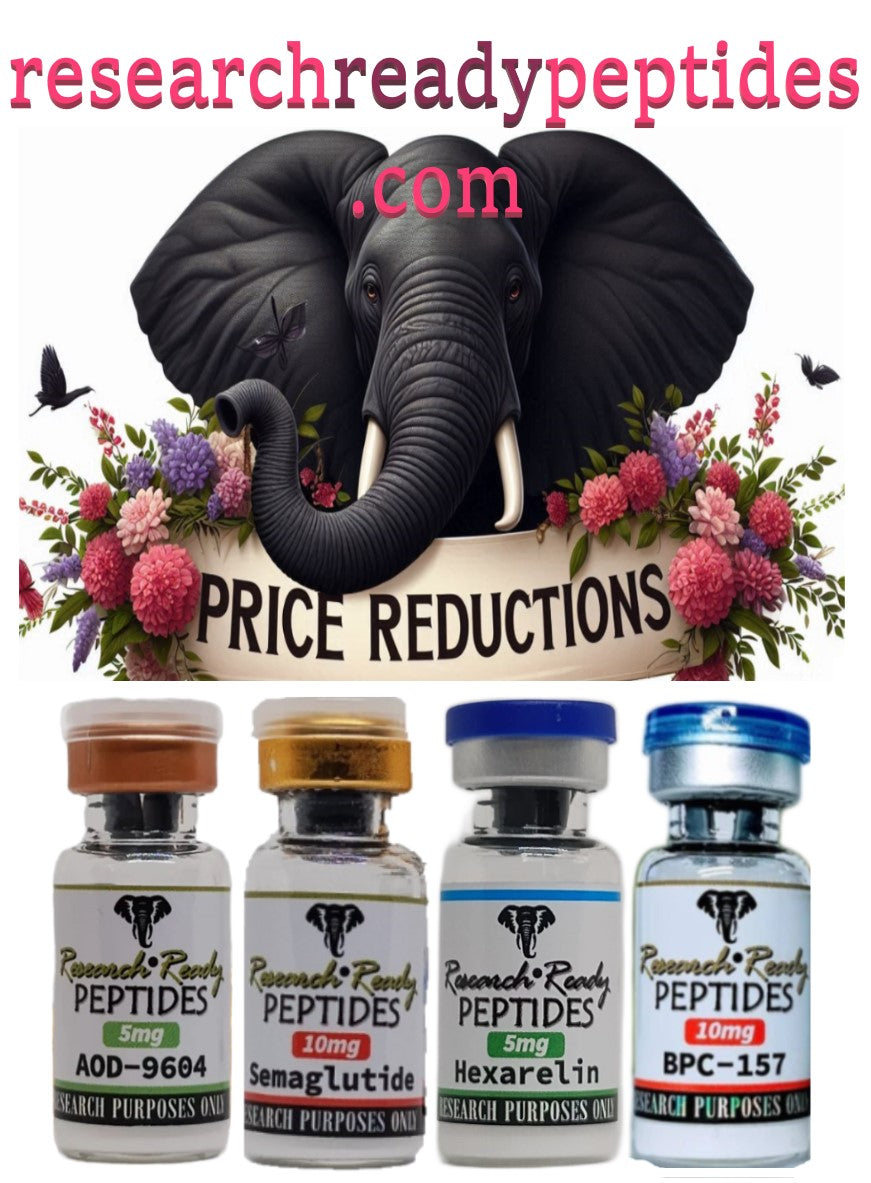
📽️🎞️ New Video Alert!
Be sure to visit VIDEO SHORTS!
@Research-ReadyPeptides on YouTube; INSTAGRAM

Protect your parcel with SecureSign
Dear Valued Researchers,
In an effort to ensure the security of your purchased and delivered parcels and protect us against fraudulent activity, we will now offer SecureSign ($.01) delivery for all parcels.
YOU MUST SELECT THIS OPTION AT CHECKOUT TO ADD SECURESIGN.
This decision was made in response to a recent incident where a package was reported as undelivered, despite tracking information indicating otherwise. Please note that the cost is passed to the customer.
By choosing not to require a signature upon delivery, the customer assumes responsibility for any loss or theft of the package once the USPS has confirmed delivery to the designated address.
WE NOW OFFER COD (Cash on Delivery), No personal checks. Debit or Post Office Money orders only accepted.
We apologize for any inconvenience this may cause, but we believe that this measure is necessary to safeguard us from fraud, and our customers packages.
Repeat customers have proven they seek not to de fraud us. We thank you for your patronage and business!
Sincerely,
Research-Ready Peptides
Everyday low prices; Sweet bulk prices
At our high-end (meaning pure products) peptide shop, we believe in transparency and fairness. Unlike some stores, we don't play pricing games or inflate our prices just to offer "sale" discounts. Instead, we've carefully curated our selection of peptides to provide you with the best value, every day. When you shop with us, you can trust that you're getting a fair deal without any gimmicks or hidden costs.
Everyday affordability is our promise to you—not limited-time promotions. We're committed to offering competitive prices, reliable COAs, and exceptional service.
Important Notice: Our research compounds are intended for laboratory research purposes only and should not be used for personal consumption. Many of these compounds are still under investigation, and their safety and appropriate dosage have not been established. To ensure your safety, please consult with a healthcare professional.
Please note that if we discover any individual using our products for personal use or in a manner inconsistent with their intended purpose, we will immediately ban such individuals from purchasing our products in the future. We are committed to maintaining the highest standards of safety and ethical conduct in the research community.

Happy Customers!
At Research-Ready Peptides, customer satisfaction is our top priority. We value your trust and strive to make your experience with us as positive as possible.
We take great pride in our rigorous quality control process, ensuring that each product is tested not just once, but twice - once at the compound pharmacy and again using a reliable and trusted 3rd party company. This ensures that you receive the highest quality products possible.
While we understand that issues can occasionally arise, we are confident in our testing process and believe it would be a rare occurrence for a customer to need to return a product. Please visit our policy page before making your purchase.
We cannot guarantee that our products will achieve specific results or desired effects, as these can vary depending on individual factors such as dosing, biology, storage, temperature conditions and other variables in the laboratory or research setting.
If you are in need of assistance with your purchase please visit the footer below for policies, returns, and terms of service; Ultimately our goal is to make your purchase a positive experience.
Flat-rate shipping $7.98.
SecureSign for delivery security $0.01.
Comprehensive Guide to Peptides: Buy Peptides for Sale, Research Peptides, Injectable Peptides, and Freeze-Dried Powder
Are you interested in peptides and wondering where to find high-quality options for your research needs? As a researcher who is exploring the benefits of peptides, we will help you navigate the world of peptides, including why Research-Ready Peptides is the place to buy peptides for sale, the types of research peptides available, the study of the benefits of injectable peptides, and the significance of freeze-dried powder.
What Are Peptides?
Peptides are short chains of amino acids linked by peptide bonds. They play crucial roles in various biological processes, including hormone regulation, immune response, and cell signaling. In recent years, peptides have gained popularity for their potential benefits in research, fitness, and healthcare.
Peptides for Sale: Where to Buy
When looking to purchase peptides, it's essential to find a reputable supplier to ensure product quality and authenticity. You can find peptides for sale from various sources, including:
- Online Retailers: Many online platforms offer a wide range of peptides for sale. The importance of finding a reputable online retailer for research peptides cannot be overstated. While many vendors offer a wide range of peptides, it is crucial to conduct thorough research on potential vendors to ensure the quality and purity of the products they sell. Purchasing from vendors who do not use third-party testing may lead to unreliable results.
To assure purity with verifiable Certificates of Analysis on every peptide sold in their shop, it is recommended to buy from vendors who employ third-party testing rather than those who make and test their own products.
To ensure your experience will be a positive one be sure to read their customer reviews to verify the nature of the company's business practices in keeping customers happy. What is their history in creating satisfied customers? What is their rating? Have you checked their return policy?
Research-Ready Peptides, working with ISO-9001 Certified Peptide Producers: ISO 9001 certification in the context of peptide manufacturing indicates that a company has implemented a Quality Management System (QMS) that meets the requirements of the ISO 9001 standard. This certification ensures that the manufacturer consistently provides high-quality products and services that meet customer expectations and regulatory requirements. Some key aspects of ISO 9001 certification for peptide manufacturing include:
- Consistent and well-documented processes for peptide synthesis, purification, and quality control.
- Regular audits and management reviews to assess the effectiveness of the QMS and identify opportunities for improvement.
- Strong customer focus, with processes in place to gather and act on customer feedback.
- Commitment to continuous improvement and innovation to stay at the forefront of peptide manufacturing technology and best practices.
Research Peptides: What You Need to Know
Research peptides are used in scientific studies to explore their effects and potential applications. These peptides are often employed in experimental settings to understand their mechanisms of action, effectiveness, and safety. Common research peptides include:
- GHRP (Growth Hormone-Releasing Peptides): Used to study growth hormone release and potential benefits for muscle growth and fat loss.
- SARMs (Selective Androgen Receptor Modulators): Investigated for their potential to enhance muscle mass and bone density.
- BPC-157 (Body Protection Compound-157): Studied for its potential healing properties and effects on tissue repair.
Injectable Peptides: Benefits and Usage
Injectable peptides are a popular choice for individuals seeking direct and effective peptide administration. These peptides are typically used to achieve faster and more targeted results compared to oral supplements. Some benefits of injectable peptides include:
- Improved Absorption: Injectable peptides bypass the digestive system, leading to higher absorption rates and more immediate effects.
- Precise Dosage: Injectable peptides allow for accurate dosage control, which is crucial for achieving desired outcomes.
- Faster Results: Direct injection into the bloodstream can lead to quicker onset of effects compared to oral forms.
Common injectable peptides include insulin-like growth factor (IGF-1) and human growth hormone (HGH). It's important to follow proper injection techniques and consult with a healthcare professional to ensure safe and effective use.
Freeze-Dried Powder: Advantages for Peptides
Freeze-dried powder is a popular form for storing and preserving peptides. This method involves removing moisture from the peptide solution, resulting in a stable, powdery substance that can be reconstituted with a suitable solvent when needed. Advantages of freeze-dried powder include:
- Extended Shelf Life: Freeze-drying helps preserve the peptide's stability and potency over time, allowing for longer storage periods.
- Convenient Storage: Freeze-dried peptides are lightweight and easy to store, making them ideal for research and personal use.
- Preservation of Activity: The freeze-drying process helps maintain the peptide's biological activity, ensuring effective results when reconstituted.
When using freeze-dried peptides, follow the manufacturer's instructions for reconstitution and storage to ensure optimal performance.
Conclusion
Understanding peptides and their various forms, such as injectable peptides and freeze-dried powder, can help you make informed decisions whether you're purchasing peptides for sale, and conducting research,. Always choose reputable suppliers like Research-Ready Peptides and follow recommended usage guidelines to ensure safety and effectiveness.
Exploring Modern Research Peptides: Tirzepatide, Retatrutide, Semaglutide, and Synergistic Effects
In the realm of peptide research, recent advancements have brought peptides into the spotlight, particularly those showing promise in weight loss and metabolic health. Noteworthy peptides such as Tirzepatide, Retatrutide, and Semaglutide have garnered significant attention for their potential benefits. Additionally, emerging studies suggest that pairing various peptides may yield synergistic effects, enhancing their therapeutic potential. This article delves into these modern research peptides, their implications for weight loss, and the intriguing findings on peptide combinations.
Modern Peptides for Weight Loss
1. Tirzepatide
Tirzepatide is a groundbreaking peptide that has shown remarkable potential in weight management and metabolic health. As a dual GIP (Gastric Inhibitory Polypeptide) and GLP-1 (Glucagon-Like Peptide-1) receptor agonist, Tirzepatide not only promotes insulin sensitivity but also helps in reducing appetite and body weight. Recent studies have demonstrated its efficacy in significantly lowering body mass index (BMI) and improving metabolic markers in individuals with obesity and type 2 diabetes.
2. Retatrutide
Retatrutide is another peptide garnering interest for its role in weight management. As a multi-receptor agonist, Retatrutide targets various pathways involved in hunger and metabolism. Clinical trials have shown that Retatrutide can lead to substantial weight loss and improvement in related metabolic conditions. Its ability to modulate appetite and enhance metabolic rate makes it a promising candidate for treating obesity and associated disorders.
3. Semaglutide
Semaglutide, a well-known GLP-1 receptor agonist, has been extensively studied for its weight loss benefits. It mimics the action of the natural hormone GLP-1, which regulates blood sugar levels and appetite. Clinical research has highlighted Semaglutide's effectiveness in promoting significant weight loss and improving glycemic control, particularly in patients with type 2 diabetes. Its success has positioned Semaglutide as a leading option in the treatment of obesity.
Synergistic Effects of Peptide Pairing
Recent research has uncovered fascinating results regarding the synergistic effects of combining different peptides. When used together, certain peptide combinations can enhance therapeutic outcomes beyond what is achievable with individual peptides alone.
1. Cagrilintide and Semaglutide
Cagrilintide is a novel peptide that complements the action of Semaglutide. When paired, these peptides can produce a synergistic effect, leading to more significant weight loss and improved metabolic parameters. Cagrilintide, which works on different receptors compared to Semaglutide, enhances the latter’s ability to regulate appetite and metabolism, resulting in greater overall effectiveness.
2. Impamorelin and Sermorelin
Impamorelin and Sermorelin are both involved in stimulating growth hormone release. Impamorelin, a selective growth hormone secretagogue, and Sermorelin, a growth hormone-releasing hormone analog, can be used together to amplify their effects. This combination has shown promise in promoting lean body mass and reducing fat, as well as in addressing conditions related to growth hormone deficiencies.
Clinical Implications and Benefits
The clinical results of these peptides and their combinations are not only fascinating but also hold significant implications for individuals with various health conditions:
- Weight Loss: Peptides like Tirzepatide, Retatrutide, and Semaglutide offer substantial weight loss benefits, which can be particularly advantageous for individuals struggling with obesity and related metabolic disorders.
- Diabetes Management: Many of these peptides, especially Semaglutide, have demonstrated effectiveness in managing blood sugar levels and improving insulin sensitivity, making them valuable tools in diabetes care.
- Synergistic Therapy: Combining peptides can enhance therapeutic effects, offering more comprehensive solutions for weight management and metabolic health.
Conclusion
Modern research peptides such as Tirzepatide, Retatrutide, and Semaglutide represent significant advancements in the field of weight management and metabolic health. The potential for synergistic effects through peptide combinations, such as Cagrilintide with Semaglutide or Impamorelin with Sermorelin, opens new avenues for improving therapeutic outcomes.
As research continues to evolve, these peptides may offer even more innovative solutions for weight loss and overall health improvement. Staying informed about these developments can help individuals and healthcare professionals make educated decisions regarding peptide therapies and their applications.
For more information on these peptides and their research-backed benefits, consider consulting with a healthcare provider or exploring trusted sources of peptide research and products.
Essential Research Databases for In-Depth Scientific Exploration
- National Library of Medicine: The National Library of Medicine (NLM) is the world's largest biomedical library and a leader in research in computational health informatics.
- Google Scholar 🔎 This is a powerful tool for finding scholarly articles, books, and other academic
- resources on a wide range of topics.
- PubMed: The National Library of Medicine that contains more than 32 million citations for biomedical literature.
- Web of Science: This platform provides access to a variety of scientific databases and tools, including the Web of Science Core Collection, which indexes over 20,000 journals.
- ScienceDirect: This is a leading platform for peer-reviewed scientific literature, with over 16 million articles from over 2,500 journals.
- Scopus: This is a large abstract and citation database of scholarly literature from over 5,000 publishers.
The Power of Peptide Molecules in Biochemistry
Key Highlights
Peptides are like tiny strings of pearls, where each pearl is an amino acid. Together, they do a lot in our bodies. They're not just the stuff that proteins are made from; they have tons of jobs to keep us running smoothly. With their help, we can fight off big health problems like cancer and heart issues through medical treatments. In everyday life, peptides pop up in things we use all the time, including food supplements to give us a boost. There's also some pretty cool science happening with peptides right now that could change how we tweak genes or even improve ourselves - think biohacking! On top of everything else, when scientists make these peptide chains, it's super important they do it in a way that doesn't hurt our planet.
Introduction
Peptides are tiny molecules made from amino acids, which are the basic elements of proteins. They're super important in biochemistry and have a big impact on things like medicine, skincare, and even our everyday lives. To really get why peptides are so powerful in different areas, it's key to know how they're structured and what they do.
When two or more amino acids link up through something called a peptide bond, that's when peptides come into being. These chains can be pretty short or quite long - ranging from just two amino acids all the way up to 100! This makes them incredibly flexible with lots of roles in our bodies.
Lately, there's been a lot of buzz about how peptides might help treat diseases like cancer and heart problems. Scientists think that drugs made from peptides could specifically target sick cells without as many bad side effects as regular drugs.
But it’s not just about health care; peptides play a role in normal life too. For example, many skin creams use them for their ability to make skin look younger and fresher. Plus, you'll find peptides in supplements claiming to help with weight loss , building muscles ,and keeping you feeling good overall .
The world of peptide research is always moving forward. Experts are diving into ways to engineer genes better drug development,and explore "biohacking" using these molecules.Peptides could change game across several fields making us healthier along way.It’s vital though we keep an eye on making sure methods used produce these helpful little guys don't hurt planet.
Understanding Peptides and Their Significance in Biochemistry
Peptides play a key role in biochemistry, acting as the essential elements that make up proteins. These large molecules are vital for many body functions like breaking down substances, sending signals between cells, and providing structure to tissues. When two or more amino acids link up through what's called a peptide bond, they form peptides.
Amino acids themselves are small organic compounds made of an amino group and a carboxyl group attached to the same central carbon atom. With 20 different kinds of amino acids available, they can be arranged in various sequences to create unique peptides and proteins that have specific structures and roles based on their sequence.
When talking about types of peptides, we categorize them by size or function. Oligopeptides are short chains consisting of 2-20 amino acids; polypeptides are longer ones with over 20 amino acids. Some special peptides act as hormones (like insulin), neurotransmitters (which help nerve cells communicate), or antimicrobial agents fighting off infections.
Hormones from these peptide groups control critical bodily processes such as growth and metabolism while neurotransmitters facilitate communication within our nervous system. Antimicrobial peptides stand guard against bacteria invading our bodies.
Grasping how different types of peptides work is crucial for exploring their biological importance and finding new ways to treat diseases.
The Basic Structure of Peptides
Peptides are made up of amino acids linked together by peptide bonds. These amino acids are special kinds of organic molecules with an amino group (-NH2) and a carboxyl group (-COOH) attached to the main carbon atom in the center. What makes each amino acid unique is its side chain, or R group, which affects how it behaves and interacts with others.
When one amino acid's carboxyl group joins with another's amino group, they form a peptide bond through a process that lets out water; this is known as condensation or dehydration synthesis. This connection between the two creates what we call a peptide bond.
At the heart of every peptide is its primary structure - basically, the order in which its amino acids are arranged. This sequence isn't random at all; it gives each peptide specific traits and functions. Even tiny changes to this lineup can really shake things up for how peptides look and work.
This arrangement plays a huge role when peptides interact with other important molecules like enzymes or receptors because it decides if and how well these interactions happen. Getting to know this primary structure inside out helps scientists big time when they're trying to come up with new drugs based on peptides.
How Peptides Differ From Proteins
Peptides and proteins are both made up of amino acids, kind of like building blocks for our bodies. But even though they seem similar, there's a big difference between them.
For starters, peptides are the shorter ones in this family. They have between 2 to 100 amino acids strung together. People sometimes call them small proteins just because they're on the tinier side. Then you've got polypeptides which are basically longer versions with more than 20 amino acids.
The main thing that sets peptides apart from proteins is their size and how complex they are. Peptides keep it simple and small while proteins go all out being larger and having a complicated structure that lets them do specific jobs inside our body.
Speaking of jobs, peptides play some pretty important roles themselves such as helping control hormones, sending signals between cells, or speeding up chemical reactions as enzymes do. These tasks show why understanding the differences between these two - especially when we talk about things like developing new medicines - is super crucial.
The Role of Peptides in Medical Therapies
Peptides are really important in the world of medicine, helping to treat all sorts of illnesses and health problems. Since the early 1900s, scientists have been looking into how peptides can be used as medication. What's cool about these peptide-based drugs is that they're better at getting right where they need to go in your body, don't cause as many side effects, and work more effectively compared to regular medicines.
With their ability to zero in on certain cells or spots in the body that need healing, peptides offer new hope for people dealing with heart diseases, cancer, and issues with how their bodies use energy from food. The study of using peptides for treatment is a super interesting area that could change how we get better when we're sick by making treatments more specific and helpful.
Advancements in Peptide Therapy for Disease Treatment
Over the years, peptide therapy has really come a long way and now offers new ways to treat different diseases. For example, it's being used in tackling heart-related issues like high blood pressure. There are special peptides called ACE inhibitors that help lower blood pressure by stopping angiotensin II from making your blood vessels narrow.
On another front, there's been progress with antimicrobial peptides too. These have shown they might be able to fight off bacteria that don't respond well to regular antibiotics anymore, which could mean fewer chances of getting severe infections. They work by messing up the outer layer of bacterial cells, offering an alternative route compared to traditional antibiotics.
However exciting these advancements may seem, it's super important not to overlook possible downsides. Peptide therapy can sometimes lead to serious side effects such as allergic reactions or problems with your heart or stomach; some people might even experience cognitive difficulties or skin sensitivity after treatment. So keeping a close eye on how someone is responding and managing their treatment carefully is key for making sure peptide therapies do more good than harm.
Peptides in Cancer Research and Therapy
In the world of cancer research and treatment, peptides are making waves. Scientists are diving into how peptides can be used to deliver drugs right where they're needed, targeting cancer cells without harming healthy ones. Thanks to advancements in peptide synthesis, creating specific peptides that latch onto cancer cells is now possible.
When it comes to supporting those with cancer, collagen peptide supplements have become quite popular. These supplements are thought to help repair tissues and boost overall health. Although more studies are necessary to fully understand their benefits for cancer patients, these supplements are safe and might offer extra nutritional support during treatment.
For skin issues caused by cancer treatments like radiation damage, collagen peptides could offer a solution too. Research has shown they may help keep the skin hydrated and elastic, easing some of the harsh effects on the skin from treating cancer.
Peptides in Daily Life
Peptides aren't just for medical use; they're a big part of our everyday lives too. You'll find them in lots of skincare products because they help fight aging. Specifically, collagen peptides are really popular for making creams and serums that aim to make your skin more elastic and reduce wrinkles.
When it comes to what we eat, peptide supplements come into play as well. Collagen peptide supplements are out there claiming to boost the health of your skin, hair, and nails. Plus, athletes might use peptides in their nutrition plans to help build muscle and recover from workouts faster.
So basically, peptides have woven themselves into our daily routines with all these benefits that could be good for us overall. But remember - it's key to know what you're using by understanding the science behind these products and sticking with brands known for being safe and effective.
How Dietary Peptides Influence Health
Peptides found in the food we eat can really make a difference to our health. When we get peptides from proteins in our diet, they help us lose weight by making us feel full longer and boosting how much energy we use up. For example, casein peptides are known to help reduce hunger.
On top of that, these tiny nutrients play a big role in managing blood sugar levels. Peptides like DPP-4 inhibitors work by slowing down the breakdown of certain hormones which then helps increase insulin release, keeping blood sugar stable.
Another key job for dietary peptides is helping with oxidative deamination - this is just a fancy way of saying they break down amino acids so our bodies can use them for energy while also keeping everything balanced and stopping harmful waste products from building up.
By understanding how important dietary peptides are for our health, we can focus on eating right to make sure we're getting enough good quality protein. This not only supports weight loss and keeps blood sugar levels steady but also ensures our body functions smoothly overall.
Peptides in Skincare: Beyond Anti-Aging
For a long time, people have known that peptides are great for keeping skin looking young. Collagen peptides, especially, are really popular because they can help make wrinkles less noticeable and make your skin more elastic.
Collagen is this important protein that makes our skin strong and firm. But as we get older, we don't make as much collagen anymore. This leads to wrinkles and loose skin. Taking collagen peptide supplements can help out by encouraging our bodies to make more collagen which is good for our skin's health.
Peptides do more than just fight aging signs though. Some types of peptides like copper ones help heal wounds faster and fix damaged skin better. They also keep the moisture in your skincare routine up high while calming down any redness or swelling you might have on your face; plus they work well with other stuff you put on your face too!
When picking products with peptides in them it’s smart to go for those from brands that know what they're doing and stick with using them regularly if you want real results over time.
Innovative Research on Peptides
Peptides are really stirring things up in research, leading to exciting breakthroughs in genetic engineering, making new drugs, and even biohacking.
With genetic engineering, peptides help change DNA and RNA bits. This lets scientists make new proteins that do specific jobs. It's a big deal for making medicines, improving crops in agriculture, and pushing forward biotech stuff.
On the drug-making front, peptides are at the forefront because they can go after certain cells or sicknesses directly. Thanks to better ways of making these peptides more accurately and efficiently than before; we're seeing some promising treatments that work better but don't have as many bad side effects.
Peptides in Genetic Engineering and Drug Development
Peptides are super important in the world of genetic engineering and making new medicines. Thanks to better ways of making peptides, we can now design them with special features for specific jobs.
In the area of genetic engineering, these tiny molecules help change DNA and RNA sequences. This lets scientists create new proteins that have exactly the traits they want. It's a big deal not just in medicine but also in biotech and farming.
When it comes to creating new drugs, peptides are stars because they're really good at honing in on certain parts of our body without causing a lot of side effects. They can go after particular bad guys like disease-causing cells or messed-up processes inside us, helping our bodies heal faster.
The whole process of putting together these peptides is central both for tweaking genes and coming up with groundbreaking treatments. With all the progress made in how we make peptides nowadays, crafting them precisely has become much easier. This opens up lots more possibilities for treating different health issues effectively.
The Future of Peptides in Biohacking
Peptides are getting a lot of buzz in biohacking, where folks try to better their health by experimenting on themselves. Such an approach can be dangerous, most especially when trying to edcuated answered from those who have little to no education in the field of peptides.
The Environmental Impact of Peptide Synthesis
Making peptides, like any chemical process, affects the environment. It's really important to make sure we're making peptides in a way that doesn't hurt our planet too much.
With how things were done before, making peptides involved using some pretty harsh chemicals. These can be bad news for both nature and people if they're not handled or gotten rid of properly.
To lessen the harm peptide synthesis does to the environment, scientists and companies are trying out cleaner ways of doing it. This includes cutting down on dangerous chemicals, tweaking how reactions happen so there's less waste and energy used up, and getting better at recycling stuff.
On top of this, new tech in biotech is helping us find eco-friendlier ways to make peptides. Using enzymes or tiny organisms offers an alternative that usually needs gentler conditions and makes less mess.
People are also looking into where we get our peptides from in the first place. Finding different sources of protein—like plants instead of animals—could be a more earth-friendly option.
By sticking with these greener methods for peptide synthesis, we help reduce its impact on our world while paving the way for pharmaceuticals and biotech fields to be more sustainable.
Sustainable Practices in Peptide Production
Making peptides in a way that's kind to the environment is totally doable. By sticking to green chemistry, we're talking about creating processes that are good for our planet and choosing materials that won't run out. This approach helps cut down on trash, saves energy, and means less nasty stuff gets used. On top of this, swapping traditional chemicals with enzymes for peptide making is another win. Enzymes work better because they're picky about what they react with, which means less mess and using less power overall. Also, by turning to things like plants instead of non-renewable resources, we make the whole process even greener. In short, keeping peptide production eco-friendly is key not just for reducing harm to our world but also for paving the way towards a more sustainable future in biochemistry.
Addressing the Environmental Challenges
Making peptides can be tough on the environment, and it's important we find ways to do it without causing harm. One big problem is all the waste that gets made when making peptides. To cut down on this waste, scientists are looking into better methods like solid-phase peptide synthesis. This approach doesn't need as much of those harmful solvents and stuff that usually go into making peptides. Another issue is using dangerous chemicals in the process. There's a push to swap these out for safer ones or figure out how to make peptides without needing so many risky substances in the first place. Also, creating peptides uses up a lot of energy, but by tweaking how reactions are done and using equipment that doesn't eat up as much power, we can lessen this impact too. By tackling these problems head-on, folks working in biochemistry are helping make peptide synthesis kinder to our planet.
Ethical Considerations in Peptide Use
When it comes to using peptides, there are a few ethical issues we need to think about. At the heart of these concerns is how tough it can be to regulate peptides in sports because they can really boost an athlete's performance. Some athletes might try to use these substances wrongly just so they have a better chance at winning, which isn't fair and messes with the true spirit of competition. To tackle this problem, there are strict rules and tests aimed at catching anyone trying to cheat by using performance-boosting peptides in sports. These efforts help make sure everyone has an equal shot at success while also looking out for the athletes' health and safety.
The Debate Over Peptide Enhancement in Sports
In the world of sports, there's a big discussion going on about using peptides to boost performance. Some people, like athletes and coaches, think it's a good idea because it can help with things like healing faster or building muscle better. They say if doctors watch over this use carefully, it should be okay. But then there are others who don't agree at all. They believe that using peptides just isn't fair in competitions and could give some players an edge over others. Plus, they're worried about how these substances might harm someone's health if not used right.
To tackle these worries, groups in charge have put together tough rules and tests to catch anyone trying to cheat by using these enhancers. Despite this effort though keeping up is hard since new kinds of peptides keep popping up making them harder to spot during drug tests.
Regulatory Challenges in Peptide Therapy and Supplementation
In the world of peptide therapy and supplements, there are quite a few hurdles when it comes to getting the green light from regulatory bodies like the FDA. Peptide therapy is all about using peptides to treat different health issues. Getting these therapies approved isn't easy; it involves lots of clinical trials to prove they're safe and work well. On top of that, making drugs based on peptides has to follow very strict rules around quality control.
Exploring Peptide Structure and Function
Peptides are made up of amino acids that are connected by what we call peptide bonds. When we talk about the primary structure of a peptide, we're referring to the exact order in which its amino acids are arranged. This specific sequence is super important because it gives each peptide its own unique characteristics and jobs. Peptides do all sorts of things in our bodies, like sending signals, speeding up chemical reactions as enzymes, and helping hold structures together. The way a peptide works and what it can do really depends on how long it is, how its amino acids are ordered, and how it folds into shape. Getting to know this link between a peptide's structure (how it's built) and function (what it does) is key for making the most out of peptides in areas like healthcare and biotech.
The Diversity of Peptide Bonds and Sequences
Peptide bonds are what link amino acids together in a peptide chain. When the amino group of one amino acid hooks up with the carboxyl group of another, they form this strong bond and let out a water molecule. This process is key to giving peptides their specific shape and firmness. Depending on how these amino acids line up - straight, in a circle, or branching off - you get different kinds of peptide chains. It's this variety that makes so many unique peptides possible, each doing its own thing in nature and science. Peptides themselves can be short with just a few amino acids or really long with hundreds strung together. Thanks to all these differences in sequences and lengths, peptides play tons of roles across biochemistry and medicine.
Functional Implications of Peptide Variability
The way peptides change can really make a difference in how they work and what they can do for us. When the order of amino acids changes, it's like each peptide gets its own unique set of features and jobs. For instance, tweaking just a bit of the amino acid lineup can change how well a peptide sticks to certain targets in our bodies, which matters a lot if we're trying to use it as medicine. These changes don't just affect how well it works; they also play into whether the peptide is stable enough or dissolves properly so that our body can actually use it effectively. Getting why these differences matter helps scientists get creative with designing peptides on purpose so they have exactly the traits needed for treating diseases better - making them more specific, long-lasting, and powerful as treatments.
Conclusion
Peptides are really handy little things that pop up in a bunch of areas like biochemistry, medicine, and even skincare. Getting to grips with what they do and how they work is super important if we want to make the most of them across different fields. They're not just about making new treatments; peptides have a role in everything from looking after our environment to thinking through the rules around using them right. As we dig deeper into all the ways peptides can be used, it's clear they've got a lot going for them when it comes to future tech and green practices. By figuring out their effects and tackling any rules or issues head-on, we're setting ourselves up for smart use of peptides everywhere you look. The whole story with peptides is one big adventure full of learning and finding new stuff that could change the game completely.
Frequently Asked Questions
What are the most common uses of peptides in medicine?
In the world of medicine, peptides play a crucial role for many reasons. They help fight off infections through antimicrobial peptides and are used in peptide therapy to treat different health issues. When it comes to cancer research, they're key in creating treatments that specifically target the disease. Peptides also have a hand in keeping blood pressure under control. But remember, even with all these benefits, it's vital to use them under a doctor's watchful eye because using them carelessly can lead to serious side effects.
Can peptides truly reverse the aging process?
Collagen peptides, a type of peptide, are gaining attention for their ability to enhance skin health and lessen the appearance of wrinkles. Although they're effective at slowing down aging signs and boosting skin's elasticity, it's important to remember that they can't completely turn back time on aging.
Questions for the shopkeeper!
Q. How to handle and store research peptides?
A. To ensure the long-lasting quality and efficacy of your unconstituted peptides, it's crucial to handle and store them properly. Keep your peptides in a cool, dry place away from direct sunlight and sources of heat. Ideally, store them in a refrigerator between 2°C and 8°C (36°F and 46°F) for optimal shelf life. Once constituted, use them within the recommended timeframe.
Q. : How do I determine reconstitution and dosing for the peptides I purchase from your store?
A: As a peptide shop, we do not provide advice on reconstitution or dosing, as this is outside our field of expertise. However, we recommend visiting Peptide Calculator for valuable information on this.
Q. How to prevent losing peptide potency?
A. To maintain the potency of your peptides, it's essential to minimize the time they spend reconstituted. While buying high milligram amounts can be cost-effective, it may lead to waste if the peptides aren't used promptly. To prevent loss of potency, we recommend purchasing peptides in quantities that align with your research needs and using them within the recommended timeframe after reconstitution. This will ensure you're getting the most out of your peptides and maintaining their efficacy.
Q. The COA says the product is "pure", can I just use it on myself?
A. Even though our COAs confirm the purity of our peptides, they are intended for research purposes.





